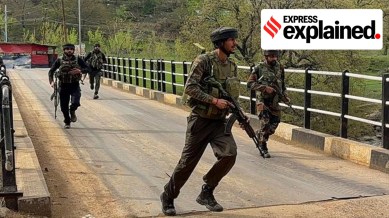Shubhajit Roy, Diplomatic Editor at The Indian Express, has been a journalist for more than 25 years now. Roy joined The Indian Express in October 2003 and has been reporting on foreign affairs for more than 17 years now. Based in Delhi, he has also led the National government and political bureau at The Indian Express in Delhi — a team of reporters who cover the national government and politics for the newspaper. He has got the Ramnath Goenka Journalism award for Excellence in Journalism ‘2016. He got this award for his coverage of the Holey Bakery attack in Dhaka and its aftermath. He also got the IIMCAA Award for the Journalist of the Year, 2022, (Jury’s special mention) for his coverage of the fall of Kabul in August 2021 — he was one of the few Indian journalists in Kabul and the only mainstream newspaper to have covered the Taliban’s capture of power in mid-August, 2021. ... Read More
2000, ’02, J&K terror’s old ghost: Pahalgam attack during high-profile US visit
The Pahalgam attack revived ghosts of the past — and a terror playbook that, security officials said, is all too familiar.

With US Vice-President J D Vance in India and Prime Minister Narendra Modi on an overseas trip to Saudi Arabia, the biggest terrorist attack targeting civilians since the 26/11 Mumbai terror attack that has killed more than two dozen civilians in Pahalgam in Kashmir Tuesday frames one of the most significant internal security challenges for New Delhi — one with external ramifications.
Indeed, since August 2019, after the special status of Jammu and Kashmir was revoked, the record surge in tourists to the state was seen as a bellwether for normalcy in the Valley. Given how tourism fuelled local employment and businesses, this was also seen as a pointer to a more prosperous future.
Yet, the Pahalgam attack revived ghosts of the past — and a terror playbook that, security officials said, is all too familiar.
For one, terrorist attacks on civilians while foreign leaders and officials were in the country was seen as aiming at maximum international publicity.
Visiting US Vice-President JD Vance posted his condolences on X: “Usha and I extend our condolences to the victims of the devastating terrorist attack in Pahalgam, India. Over the past few days, we have been overcome with the beauty of this country and its people. Our thoughts and prayers are with them as they mourn this horrific attack.”
Calling it “deeply disturbing news out of Kashmir”, US President Donald Trump said: “The United States stands strong with India against terrorism. We pray for the souls of those lost, and for the recovery of the injured. Prime Minister Modi, and the incredible people of India, have our full support and deepest sympathies. Our hearts are you with all!”
On the night of March 20, 2000, the massacre of 36 Sikh villagers in Chittisinghpora village of Anantnag district in Jammu & Kashmir by Pakistan-sponsored militants came just ahead of US President Bill Clinton’s visit from March 21-25.
Then Prime Minister Atal Bihari Vajpayee had raised Pakistan’s involvement with Clinton. At that time, Clinton toured Jaipur and Agra while Secretary of State Madeline Albright and Deputy Secretary of State Strobe Talbott had remained in Delhi to talk to Indian officials.
Two years later, when US Assistant Secretary of State for South Asian Affairs Christina B Rocca was visiting India, a terrorist attack took place on May 14, 2002, near Kaluchak in J&K. Three militants attacked a Himachal Road Transport Corporation bus from Manali to Jammu and killed seven people. They then entered the family quarters of the Army and fired indiscriminately, killing 23 people, including 10 children, eight women and five Army personnel. The age of the children killed ranged from four to 10 years. Thirty-four people were injured in the attack.
The Pahalgam attack also comes a week after Pakistan Army chief General Asim Munir’s statement that Kashmir is Islamabad’s “jugular vein” which was met with a sharp riposte from the Ministry of External Affairs (MEA).
Addressing the Overseas Pakistani Convention in Islamabad last week, General Munir had said: “Our stance is absolutely clear, it was our jugular vein, it will be our jugular vein, we will not forget it. We will not leave our Kashmiri brothers in their heroic struggle.”
“Our religions are different, our customs are different, our traditions are different, our thoughts are different, our ambitions are different. That was the foundation of the two-nation theory that was laid there. We are two nations, we are not one nation,” Munir had said in one of his strongest statements in the recent past.
Responding to questions on Munir’s remarks, MEA’s official spokesperson Randhir Jaiswal said on Thursday: “How can anything foreign be in a jugular vein? This is a Union Territory of India. Its only relationship with Pakistan is the vacation of illegally occupied territories by that country.”
With the PM in Saudi Arabia, it is expected that the Pahalgam attack will be part of the conversation between Modi and Crown Prince Mohammed bin Salman.
“We consider Saudi Arabia as a force of positivity and stability in the region. As maritime neighbours, India and Saudi Arabia share a natural interest in safeguarding peace and stability in the region…We have seen steady progress in security cooperation. This includes areas such as counterterrorism, combating extremism, disrupting terror financing and tackling drug trafficking,” Modi said in an interview to Arab News ahead of the visit.